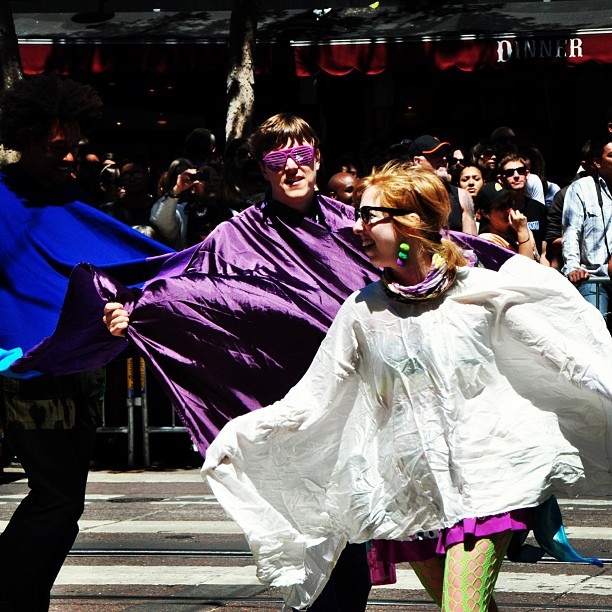I'm just coming down off a serious travel experience. Not adverse like a twelve hour canoe trip, instead a pleasurable immersion of weeks in a safer situation: Scandinavia! My Mom had never been to Sweden, Norway and Denmark. I'd been some to each; I was excited to enjoy the trip and time with her.
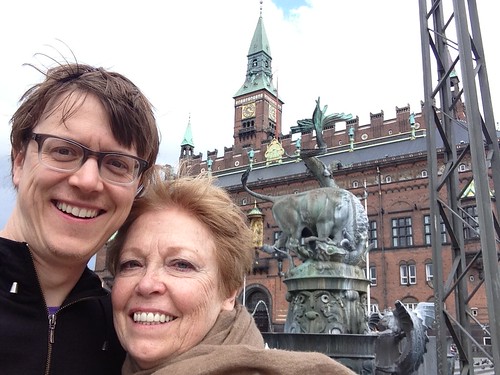
As the plane left San Francisco on 29 June arcing into 3 weeks of near perpetual daylight, I threw the I Ching asking "how should I think about my three week trip to Scandinavia with my Mom in July 2013?" The reply was a single unchanging hexagram: #12 Stagnation. Basically, nothin is happening in a constructive way. My talents are at best ignored and otherwise perhaps misdirected and mistaken. RL Wing's advice: "withdraw."
So, I withdrew into vacation! I did everything our travel agent lined up for us - our jam-packed schedule of tours and attractions. I assisted and complied with my Mom and her passion for timely schedules. I took in the sights, taking some light photographs and video with my mobile devices. And, in between I went on a fiction reading binge.
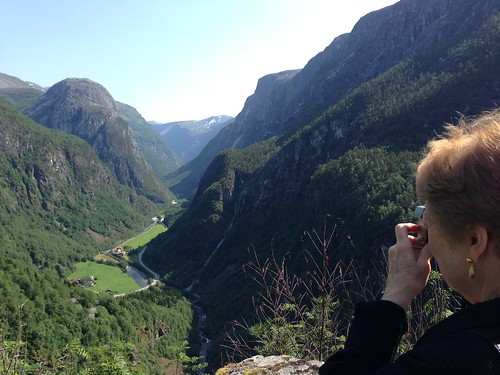
I started with Pagan Passions by Randall Garrett & Laurence Mark Janifer - a science fiction story about the return of the Greek Gods that I found on a free e-Book archive. Amusing and brief.
Then I delved into fiction associated with this area: I had heard there was such a thing as "Scandinavian crime fiction" so I started my search for something Norwegian to read while I was in Norway:
I started with Thomas Enger: books Burned and then Pierced. Fire sat at the core of the protagonist Henning Juul's personal tragedy - seems fitting for a Norwegian fiction series. So much fire in that country's past! The downside of ready access to quality lumber: a likely explanation for Norway's dearth of fewer historical structures, compared to the stone edifices scattered throughout Denmark and Sweden. I enjoyed that thoroughly and was frustrated to discover the third novel won't be out in English for a while to come.
Lists of Scandinavian fiction frequently include Jo Nesbø. I read the first in his Harry Hole series of detective novels: The Bat. I was turned off by the jocular, alcoholic-hulk hero here, and the Australian setting wasn't what I was looking for. Though Nesbo's Norwegian hero did have some provocative remarks about his home country:
Harry talked... about the country to the north that saw itself as enterprising and forward-looking, but seemed more like a banana republic. Which had forests and harbors when the Dutch and English needed timber, which had waterfalls when electricity was invented and which, best of all, discovered oil outside its front door.
"We've never made Volvo cars or Tuborg beer," Harry said. "We've just exported our nature and avoided thinking."

Anne Holt interested me as a former policewoman and minister of justice turned writer. I tore through her books Blind Goddess, Blessed are Those Who Thirst, Death of the Demon. Good mysteries, well-drawn characters, compelling drama. Her Norwegian setting meant that I had some ready vide of the city's big plazas, famous streets, festivals and highways overlaid with police response. The pleasant summer tourism crackled with electric potential: for both suffering and the redress of grievances.
Holt's books were written in the 1990s, so characters are just beginning to use desktop computers in police work, and the protagonist's lesbianism is a controversy. So these books are dated perhaps, but not unpleasant or irrelevant; more a fascinating, heartening reminder of how far we may have come in just a few decades.
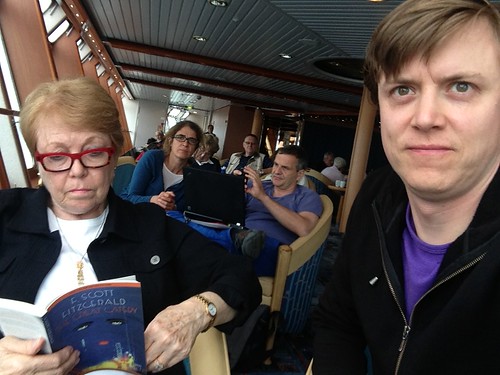
Dregs by Jorn Lier Horst wrapped up my Norwegian reading series, as I headed into a week in Sweden: fascinating to see from the genre that police-media convergence was common in these books. Having been a journalist, it's ennobling to read how our work might solve mysteries and right wrongs. But also stir up danger and irritate people.
Heading from Norway to Sweden, I took up Steig Larsson's thrilling Millennium trilogy: The Girl with the Dragon Tattoo, The Girl who Played with Fire, The Girl who kicked the Hornet's Nest. These three books were ubiquitous between film and television and bestseller lists a few years back; I purchased the three while I was high on painkillers sleeping in a recliner but I waited to read the three until I could plow through them at once. I was glad I waited to to be meeting Lizbeth and Mikael while I was in Sodermalm and Ostermalm and riding down the E4. There are "Millennium" tours of Stockholm, to show you the buildings that the different protagonists are said to live in. I skipped that, but learned vaguely which neighborhoods were which - as I appreciated the 20 hours of daylight I could leverage to keep pace with the story on my eBook reader.
In 2001? I came to Stockholm to visit my friends at a group house called DemonBox. One night the Demonbox community did some reverse gender programming: women went into the basement and wrestled each other, while we males met sat together giving each other foot massages and talking about our mothers. The idealism and commitment to gender awareness and equity there struck me at that time; reading Steig Larsson reminded me of that - perhaps Scandinavian - passion to actively evolve our approach to social architecture.
Larsson's series is filled with an urgent indignant aversion to organized hate, casual prejudice and institutional privilege. As the protagonist Blomqvist says late in the series: "When it comes down to it, this story is not primarily about spies and secret government agencies; it's about violence against women, and the men who enable it." The fact that so many people have read the books and seen the movies is a fascinating dissemination of Larsson's views. My Swedish friends said he worked on an anti-racist newspaper; the novels had a far-wider reach and readership.
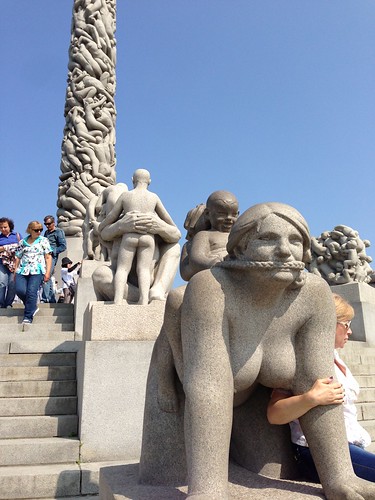
Then on Svante's recommendation I read Misterioso by Arne Dahl - named after a Thelonious Monk song and concerned with the fallout from recent large-scale economic crimes. Good swift reading, saddened only to see that the next book in the series won't be out in English for some time to come. Reading foreign fiction series often ends in sad waiting for translation.
Hungry for still more Swedish crime fiction, I took up Faceless Killers by Henning Makell which was based in rural Sweden. As is my won't, I selected the next book in the series: The Dogs of Riga which explored the relationship between Sweden and Eastern Europe around the time of fall of communism. I went on to read more Henning Mankell books as I flew back to San Francisco, woke up for the first day of my sabbatical and began my funemployment.

A month ago I hadn't read a single work of Scandinavian Crime Fiction. Now I've read fifteen books by seven authors. Besides giving the landscape some context, crime fiction dramatizes issues these folks are wrestling with. Who is Scandinavian? How can immigrants be integrated in a well-ordered society? How should World War II profiteers be treated? What does gender equality actually feel like in the workplace? How do alternative modes of sexuality challenge people? What unease and chaos lurks beneath smooth scandinavian design, a generous welfare state, and historic native ethnic homogeneity?

Sitting in a Rorbu near Solvær above the arctic circle, sipping on internet on my mobile phone, I discovered scandinaviancrimefiction.wordpress.com - a community dedicated to parsing these books and issues together for English speakers. I was glad to find them. Maybe I've found a genre and writers I will enjoy for years to come. Or maybe I will switch to books that will give me new context on new frontiers.
I remember seeing my father sitting up in to the ice-has-melted point past midnight when his spy or crime novel was soon to be finished and placed on the burgeoning shelf above him. Since he died when I was young I didn't exactly trace out how his reading of mystery fiction exercised his big brain. It would be enough to call it pleasure, of course. But drinking can also be seen as a pleasure, and he took that seriously.
So approaching middle age myself now, seeing myself tear through crime novels at a hastened clip, perhaps I become more like my father, still mostly sans booze. Or maybe I'm a human - many of these books are best sellers: Scandinavian crime fiction is a vetted human pleasure.







